In my previous post, I discussed the arguments of directors Deborah Pearson and George Hunka against narrative. Specifically, Pearson argued that narratives are problematic because they erase those experiences and people which do not fit the narrative’s version of events (e.g., how the narrative of ‘manifest destiny’ erased Native Americans from America’s story). Hunka argued that the destruction of author-created narrative is ‘liberating’ for the audience member, who can then decide his own story. The disruption of narrative allows the viewer ‘to find oneself, not to lose oneself, in the theatrical experience’.
As a Christian, I fundamentally disagree with Hunka’s suggestion that narrative leads to oppression and death because I do not believe that one can find oneself unless one loses oneself. Instead, I would suggest that a narrative can be life-giving or life-stealing depending on its conformity to Truth, by which I mean its conformity to the Story told by God. One interpretation of a set of events may be more true than another. For example, an author may present a martyr who dies for Christ as a hero, whereas his audience member may believe that martyrs are fools. I would argue that if the audience member loses himself in this author’s story, he may come to a true understanding of martyrdom, which may (who knows?) free him to undergo his own martyrdom.
One cannot receive a story without, for the time the story lasts, accepting the author’s authority. And accepting that authority can allow an audience member to enter into a point-of-view he never considered before. Stories can increase empathy exactly by sweeping their audience up into their narrative. I did not feel empathy for prisoners until I read Les Misérables and lost myself in Jean Valjean’s story. It all depends on which stories the artist chooses to tell. Narratives must exclude in order to be intelligible; stories highlight certain experiences and people in order to make an underlying meaning clear. Artists can choose to tell titillating stories about the rich and powerful; however, they can also choose to tell stories about the traditionally voiceless, such as the prisoner, the immigrant, or the abused child. The act of excluding some characters, experiences, and points-of-view in a narrative in order to draw the audience’s attention to those characters and experiences whose meaning the artist is trying to communicate does not mean excluding those people and experiences permanently from real life. One cannot tell all the stories at once.
Finally, I return to Pearson’s suggestion that we tell stories because we are unable to face the lack of meaning we might find in reality. It seems to me that the rejection of narrative is linked philosophically to a rejection of meaning or at least a meaning which I do not create myself. To reject narrative is to reject the existence of any Story outside my own story. Actually, the rejection of narrative leads to the consequence Pearson feared. Pearson feared that narrative would trap a person in her story, unable to see the stories of others. In fact, the experience of narratives told by others enables a person to step out of her own story and enter into the stories of others, thus growing closer to them.
To use narrative means to affirm that events have meaning – they are not just chains of cause-and-effect. The narrative of the theatre, and other forms of storytelling art, points to the narrative of real life, and suggests the possibility that if characters’ lives in a story are ordered by an author to some end, so, too, our lives might be ordered by an Author to some end. And in the Christian narrative, that end is a happy one – especially for the voiceless and oppressed.
How should Christian artists ethically use narrative, if at all? What are the problems you see with narrative, and what are some possible solutions?




Cole, thanks for this very excellent follow up to your last post. Again, I think we are generally in agreement about the importance of narrative, and the foolhardiness of any attempt to categorically do away with narrative.
As I read this post, a question occurred to me that I had not thought of before. You said that “narrative can be life-giving or life-stealing depending on its conformity to Truth, by which I mean its conformity to the Story told by God.” How does human sin factor into your concept of narrative. If human sinfulness blinds us from knowing the Truth (as I think it does), then do not all narratives ultimately fail to conform to the truth, and so they must contain an element of what you call “life-stealing”? Is this not a good reason to, at the very least, hold the narratives we create tentatively and critically?
Yes, I agree with you. All human narratives are imperfect, and therefore ought not to be swallowed blindly. For example, Tolkien and Lewis are often called to task for making their darker-skinned races villains. While I don’t believe they had racist motives or honestly thought humans with darker skins were more immoral, uncritical readers, especially children, can come to associate Arabs, Africans, Pakistanis, etc with “bad guy”. (Lewis’ and Tolkien’s stories aren’t nearly the worst, or only, culprits: witness 24 or Birth of a Nation.) Being aware that there is a danger of learning something untrue from these narratives can help keep us from internalizing these falsehoods and being led by them into sin (such as mistreatment of our fellow human beings).
I hope this isn’t pressing the point too much, but if all narratives are imperfect (and perhaps some very much so), then might there be a place for works of art primarily aimed at disrupting those problematic narratives. So, we might all agree that the manifest destiny narrative is problematic, and then also agree that a work of art challenging this narrative could be helpful. Your interlocutors do not only consider the manifest destiny narrative to be problematic, they have made a further leap by considering all narratives to be problematic. But this leap aside, perhaps there is a way to put a more positive, even Christian, spin on the sort of theatre or art that Pearson and Hunka are advocating. Might a piece of theatre speak prophetically into a culture if it breaks down the ‘master narratives’ that hold people in oppression?
Also, if a novel or movie lacks a narrative, is that novel or movie implicitly advocating the disruption of all narratives? When thinking more about your posts, the film ‘Tree of Life’ came to mind, which has a very loose narrative, if there is a narrative at all. That of course does not mean that the film is unorganized or random (though I think many people would describe it that way). I only mention this because I wonder how closely connected the theory and the art actually are.
While this discussion is very interesting, I find the question regarding artists of faith using narrative laughable. Over 70% of our Scriptures are either narrative, poetry or some sort of story. Jesus used narrative as his primary teaching tool. The majority of cultures use oral narratives as their primary means of trans-generational transference of history and cultural definition. Therefore, I submit, the answer to your final question is, “Without doubt Christian artists should use narrative in the transmission of beauty and truth.”
Thanks for your thought-provoking essays.
(P.S. This form would not accept my website url as valid. What’s up with that?)
Dianne,
Thank you for your comment, and for making a very good point! I raised the question hoping commenters might bring up new arguments for narrative (or bring up possible objections that Christians still might have to at least some forms of narrative). I think your point that Christ used narrative, and therefore gave us license to do so as well, a very strong one. (And one might say that by assuming narrative, he redeemed it!)
Sorry that I don’t know the answer to your website URL question.
Cole